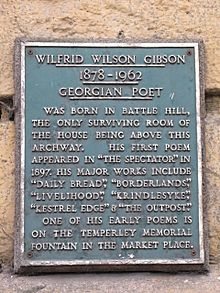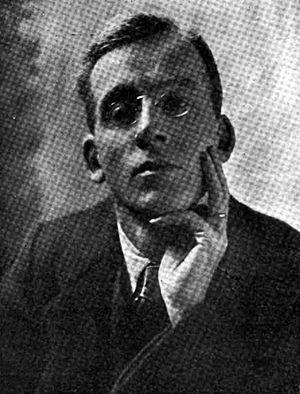Wilfrid Wilson Gibson facts for kids
Wilfrid Wilson Gibson (born October 2, 1878 – died May 26, 1962) was a British poet. He was known as a "Georgian poet," a group of writers active in the early 1900s. Gibson wrote many poems, especially during the time of World War I. He kept publishing his poetry even into the 1940s and 1950s.
Early Life and Poems

Wilfrid Wilson Gibson was born in Hexham, a town in Northumberland, England. His parents were Elizabeth and John Gibson. His father was a chemist who also loved photography and old things. Wilfrid's older sister, Elizabeth, was a poet too. She taught him a lot and helped him with his writing.
Gibson started publishing poems in magazines when he was just 17, in 1895. His first books of poems came out in 1902. He also wrote plays in verse, which are like plays but written as poems. These were published in 1907 and 1908.
Even though he later lived in London and then in Gloucestershire, many of Gibson's poems were about Northumberland. He wrote about places like Hexham's Market Cross and Kielder Stone. Some of his poems also talked about people facing hardship in the wild Northumberland countryside. He wrote about fishermen, factory workers, and miners. His poems often used ideas from local folk songs and stories from the North East.
In London, Gibson met other famous writers like Edward Marsh and Rupert Brooke. He became very good friends with Rupert Brooke. After Brooke died, Gibson helped manage his writings. This was when the first Georgian Poetry book was being put together. Gibson was an important part of this group of poets.
Early in his career, Wilfrid Wilson Gibson wrote poems that were a bit spooky or mysterious. One famous poem is "Flannan Isle," which is based on a real-life mystery about lighthouse keepers who disappeared.
Gibson was also one of the writers who started the Dymock poets group. This was a community of writers who lived for a short time in the village of Dymock in Gloucestershire, just before World War I began.
Besides poems, Gibson also wrote plays and other types of books. He wrote about how important poetry was, even during World War II. He also wrote reviews of other people's books, especially those about poetry and literature.
Later Years and Legacy
Wilfrid Wilson Gibson passed away on May 26, 1962, in Virginia Water, Surrey.
After his death, his poems became less famous when new styles of poetry, like those by Ezra Pound and T. S. Eliot, became popular. However, many people still enjoyed his work for a long time.
 | Leon Lynch |
 | Milton P. Webster |
 | Ferdinand Smith |


